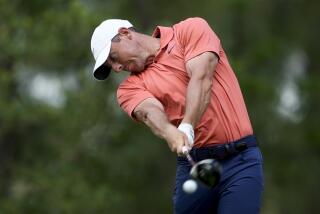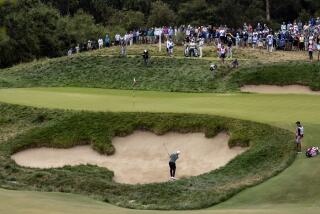Jet setters need more lag time at U.S. Open
- Share via
NEW YORK -- The Jet Lag Open began Monday with the sluggishness you’d expect of a post-Beijing tennis major that ought to have an official Melatonin supplier.
“I’m actually falling asleep right now,” Jelena Jankovic said around 10 p.m. EDT, and the world’s No. 2 player said that during her own news conference after beating 16-year-old San Diegan Coco Vandeweghe, 6-3, 6-1, a night match that kept Jankovic up well past her body’s recent chosen bedtime of around 7 p.m.
Barely had Jankovic presumably dozed off in a courtesy car when an Olympic achiever looked similarly woozy. Ninth-ranked James Blake, who solved Roger Federer on his way to a fourth-place finish in Beijing, went meandering into the Flushing Meadow night with Donald Young, the 19-year-old from Atlanta ranked No. 102 and hauling around an 8-17 match record this year.
Yet with a 1-6 career Grand Slam match record, Young gamely ushered Blake into a taut fifth set and left him standing annoyed, with hands on hips, before Blake pulled it out, 6-1, 3-6, 6-1, 4-6, 6-4.
By the 12:35 a.m. finish, it had grown clear that on a night that began with a gala honoring 25 past U.S. Open champions from Rod Laver to Chris Evert to Gabriela Sabatini to Ilie Nastase to Boris Becker to Billie Jean King, any grouch in Arthur Ashe Stadium might’ve noted that those players never had to handle a U.S. Open with a Beijing thrown in.
As current players seek a rhythm -- a circadian rhythm -- even those with new gold medals feel sort of blah.
Rafael Nadal, in his first Grand Slam tournament as a No. 1-seeded player, fought himself and the 28-year-old, 136th-ranked German rabbit Bjorn Phau to win, 7-6 (4), 6-3, 7-6 (4), then said, “It’s important, jet lag. The rest is fine. The problem is play Toronto, Cincinnati, Beijing, come back here. So in two weeks, two times, 12 hours jet lag. Before, after Wimbledon I only have six, seven days for recover. Before Wimbledon I play Queen’s, Monte Carlo, Barcelona, Hamburg, Roland Garros, and Wimbledon, too. The system is very tough, no?”
As if to reassure, he said, “I think I’m ready for these things.”
The other Olympic singles champion, No. 5 Elena Dementieva, achieved a rare feat Monday, haltingly winning a U.S. Open match with her groundstrokes in New York while her brain remained in China.
“Still, I mean, all my thinking is there in Beijing,” she said after struggling past Akgul Amanmuradova of Uzbekistan, 6-4, 7-5. “Yesterday I was trying to go to sleep, but, I mean, I couldn’t go because I was watching, you know, the closing ceremony, and you know, my mind is still there.”
Her body left, though, and even stopped off Wednesday for a brief celebration with her mother and her tennis club in Russia, which was on the way, as was most of the rest of the world.
In limited study, a first-round loss in Beijing came off as shrewd pre-U.S. Open strategy, as those who resembled themselves included No. 6 Andy Murray and No. 4 Svetlana Kuznetsova.
Murray tore through 107th-ranked Sergio Roitman of Argentina, 6-3, 6-4, 6-0. Kuznetsova, who won the 2004 title and became the only person wearing sweat pants in the champions’ gala, breezed through qualifier Shuai Zhang of China, 6-4, 6-2.
Still, the wise old owl Lindsay Davenport worked through a tricky first-round draw against 41st-ranked Aleksandra Wozniak of Canada, winning, 6-4, 6-2, and said the jet-lag phase should be over. “Everyone’s been back from Beijing for eight days at the minimum now,” she said, forgetting the common wisdom of one day for every time zone, leaving some with four days still to stagger.
More to Read
Go beyond the scoreboard
Get the latest on L.A.'s teams in the daily Sports Report newsletter.
You may occasionally receive promotional content from the Los Angeles Times.










